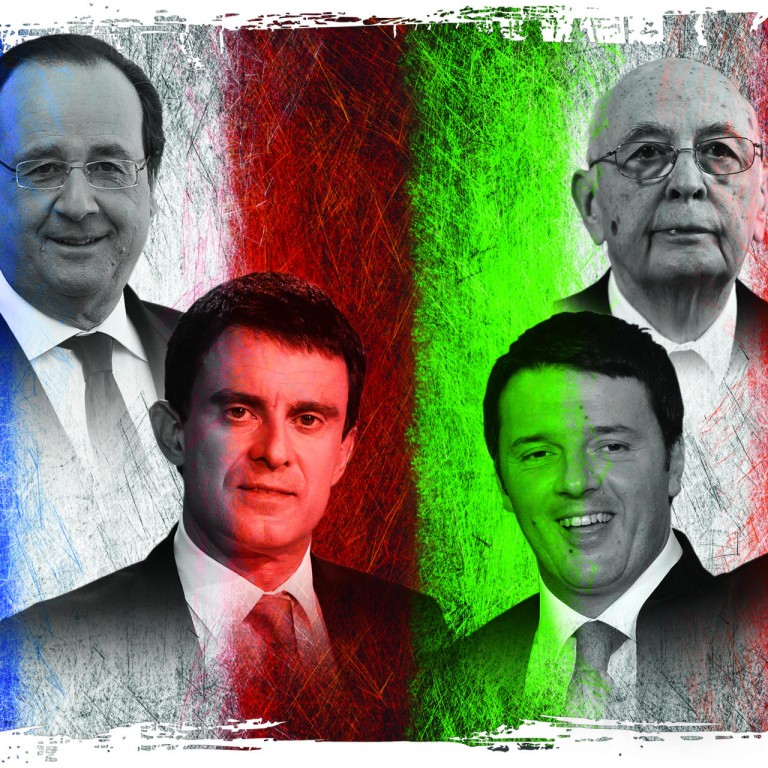
France's growth push sets up showdown with Brussels
Hollande is pushing ahead with his economic policy, counting on a newly appointed reform-minded premier and a deep and liquid bond market
There is, after all, hope for France and Italy, the two main reform laggards in Europe's single-currency area.

This is an important development, given the conspicuous failure of France and Italy to reform their woefully uncompetitive economies before the outbreak of the euro-zone crisis in 2010 and in the past four years, when many of the so-called "peripheral" members of the bloc, notably Spain, undertook much-needed product and labour market reforms.
France is flirting with deflation, making the country’s public debt burden even less sustainable
France, which, despite its severe economic woes, never faced the wrath of the bond markets during the acute phase of the euro-zone crisis, has become the epitome of the "slow-burn" crisis - and an illustration of the extent to which the underlying problems of the euro zone (a lack of growth and extremely poor economic and political governance) extend deep into the core of the bloc.
After registering no growth over the past two years, France's economy is expected to expand 1 per cent this year, roughly on a par with Spain and Portugal and below Ireland's projected growth of 1.8 per cent.
Most worryingly, France's public expenditure and tax burden as a share of gross domestic product are the second-highest in the euro zone after Finland.
The appointment of the charismatic and market-friendly Manuel Valls on Tuesday as France's new prime minister is a sign that President Francois Hollande, whose deep unpopularity among the electorate was evidenced by the drubbing his Socialist party received in last Sunday's elections, is determined to implement his so-called "responsibility pact".
The pact, which was launched by Hollande in January following a backlash against his government's heavy tax increases during its first two years in office, is an ambitious plan to cut France's excessive payroll taxes by €30 billion (HK$321 billion) and reduce public spending by €50 billion in the hope of spurring growth and creating jobs.
Valls, who, like his new Italian counterpart, Matteo Renzi, is on the right of Hollande's Socialist party and has been a long-time admirer of Tony Blair, the modernising former British premier, has an approval rating of 50 per cent, largely because of his popular anti-immigration stance during his previous job as interior minister.
Hollande is counting on Valls' communication skills and popular touch to help rescue his floundering presidency.
However, while France's new premier may be an economic liberal, Hollande's newly reshuffled cabinet is more leftist than his previous one, with Arnaud Montebourg, one of the staunchest opponents of fiscal austerity in the euro zone, becoming the new economy minister.
Hollande's political balancing act, while essential to appease the increasingly restless left wing of his Socialist party, which is deeply suspicious of both the "responsibility pact" and the ascension of Valls to the premiership, will be viewed dimly by the European Commission.
Brussels has been pressuring France to adhere to its commitment to bring its budget deficit within the European Union's limit of 3 per cent of GDP by next year and push ahead with structural reforms.
Yet even Valls has made it clear that his overriding priority is to boost growth - a sign that France has no intention of allowing fiscal consolidation to snuff out a fledgling economic recovery.
All this sets the stage for a showdown with Brussels - and, more importantly, Germany, which believes that the commission is being far too lenient with France - over the direction of French economic policy.
The stakes are very high. As the International Monetary Fund noted in its latest health check on France's economy, "a failure of growth to recover would make it more difficult to reverse debt dynamics in the short run".
France's public debt is now veering towards 100 per cent of GDP, with the commission expecting gross government debt to reach 96 per cent of output this year - up from 82 per cent in 2010.
What's worse, France is now flirting with deflation, making the country's public debt burden even less sustainable.
Much hinges on the progress Valls is able to make in cutting public spending, particularly on social entitlements, which, according to the IMF, account for the largest share of GDP in the advanced economies that belong to the Organisation for Economic Co-operation and Development.
It is very difficult to see Hollande, particularly after this week's cabinet reshuffle, making swingeing cuts in public spending. This is a government that is going for growth.
The question is whether bond investors, which have until now given Hollande an easy ride, will start to lose confidence in France.
This is unlikely to happen. France benefits from having a sufficiently deep, liquid and relatively safe bond market that acts as a second-best alternative to even richer German debt. Indeed, this is partly why Hollande feels he can challenge Brussels.

